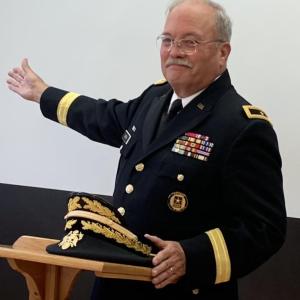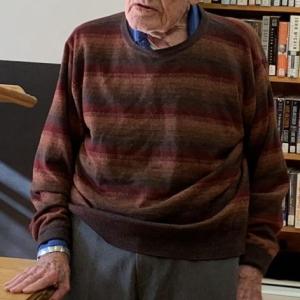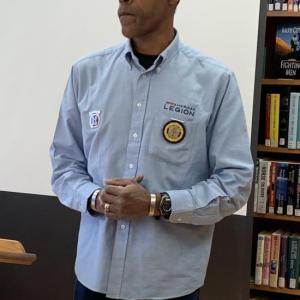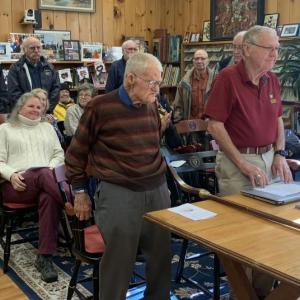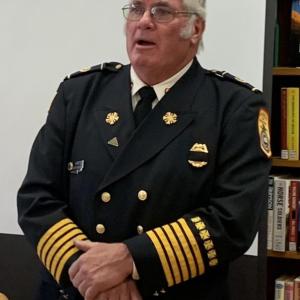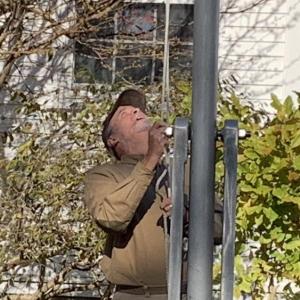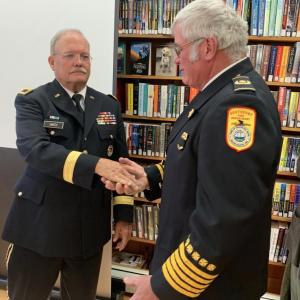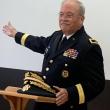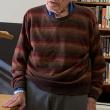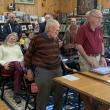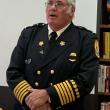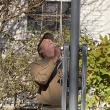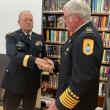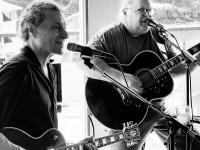General recalls Boston Marathon bombing during Southport Veterans Day talk
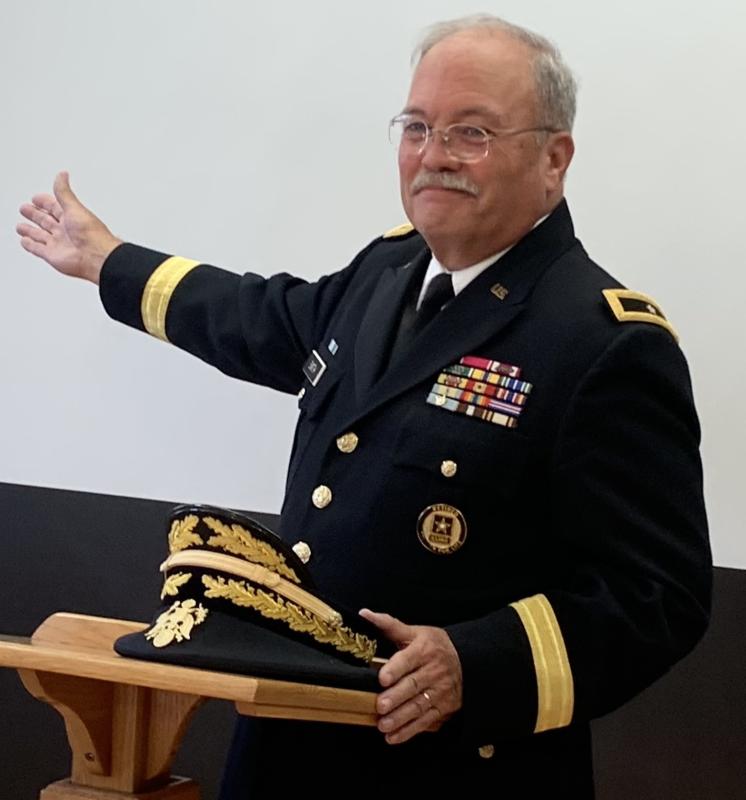 Brigadier General Paul Smith was the featured speaker Nov. 11 at Southport Memorial Library's Veterans Day ceremony. BILL PEARSON/Boothbay Register
Brigadier General Paul Smith was the featured speaker Nov. 11 at Southport Memorial Library's Veterans Day ceremony. BILL PEARSON/Boothbay Register
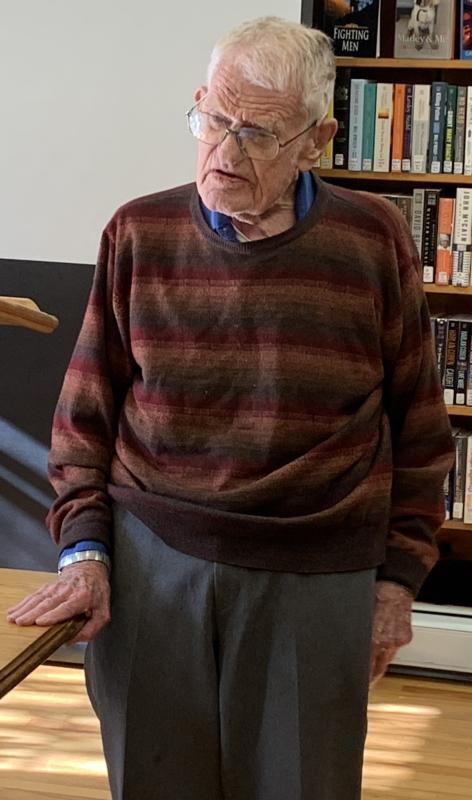 Vietnam veteran Dr. Barclay Shepard recited the poem “In Flanders Fields” during Southport Memorial Library's Veterans Day ceremony. BILL PEARSON/Boothbay Register
Vietnam veteran Dr. Barclay Shepard recited the poem “In Flanders Fields” during Southport Memorial Library's Veterans Day ceremony. BILL PEARSON/Boothbay Register
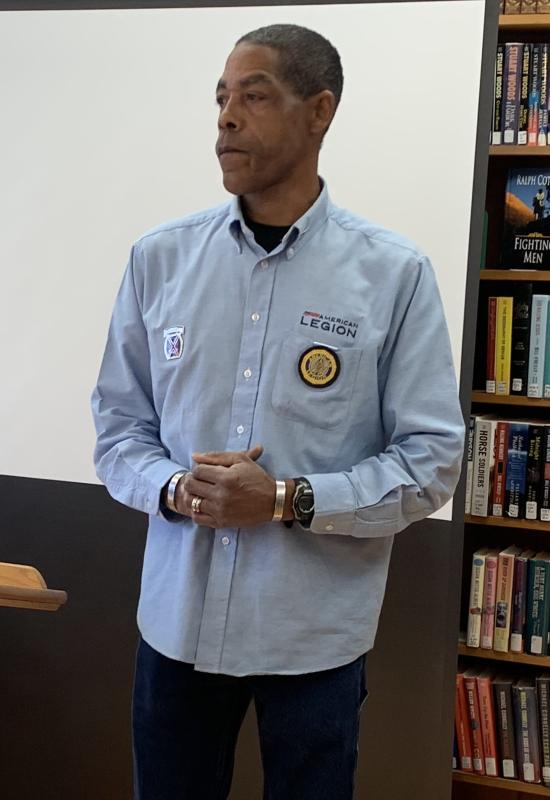 U.S. Army veteran Chris Armstead spoke about his military career on Veterans Day. BILL PEARSON/Boothbay Register
U.S. Army veteran Chris Armstead spoke about his military career on Veterans Day. BILL PEARSON/Boothbay Register
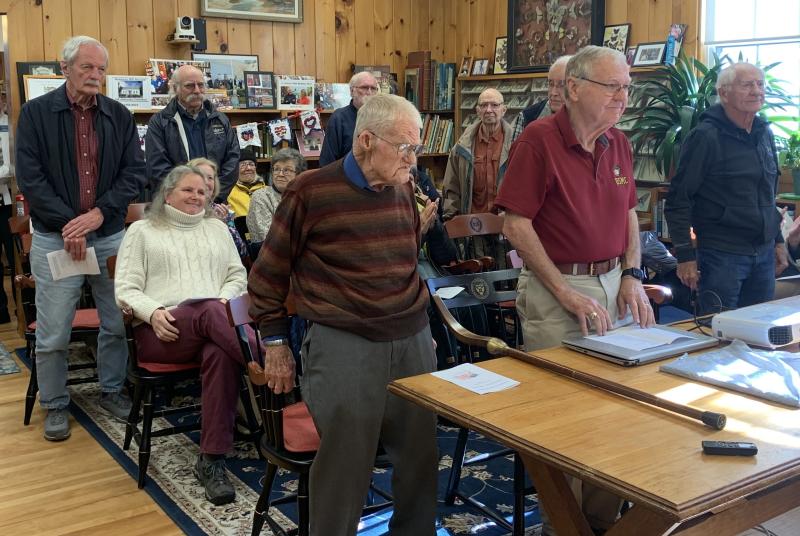 It was standing room only on Nov. 11 during Southport Memorial Libary's Veterans Day ceremony. BILL PEARSON/Boothbay Register
It was standing room only on Nov. 11 during Southport Memorial Libary's Veterans Day ceremony. BILL PEARSON/Boothbay Register
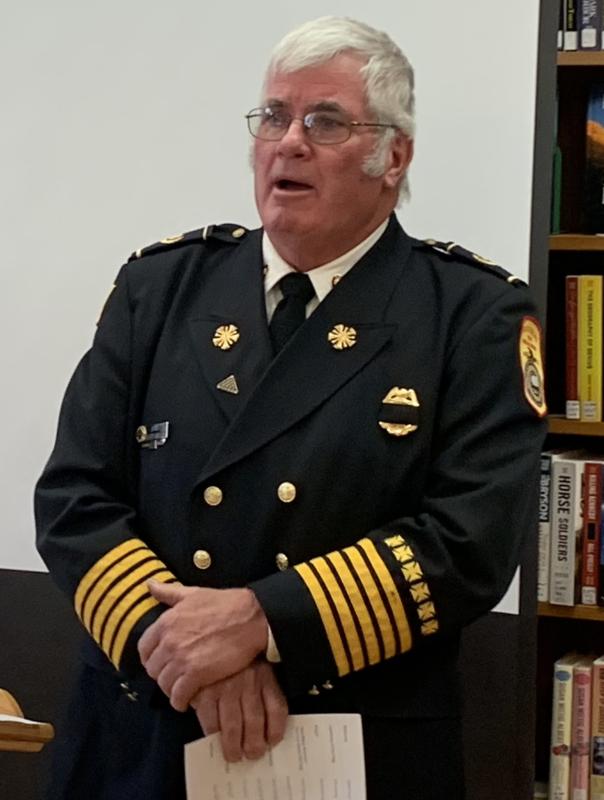 Fire Chief Gerry Gamage led the audience in singing "God Bless America" and "You're A Grand Old Flag” during the Veterans Day ceremony. BILL PEARSON/Boothbay Register
Fire Chief Gerry Gamage led the audience in singing "God Bless America" and "You're A Grand Old Flag” during the Veterans Day ceremony. BILL PEARSON/Boothbay Register
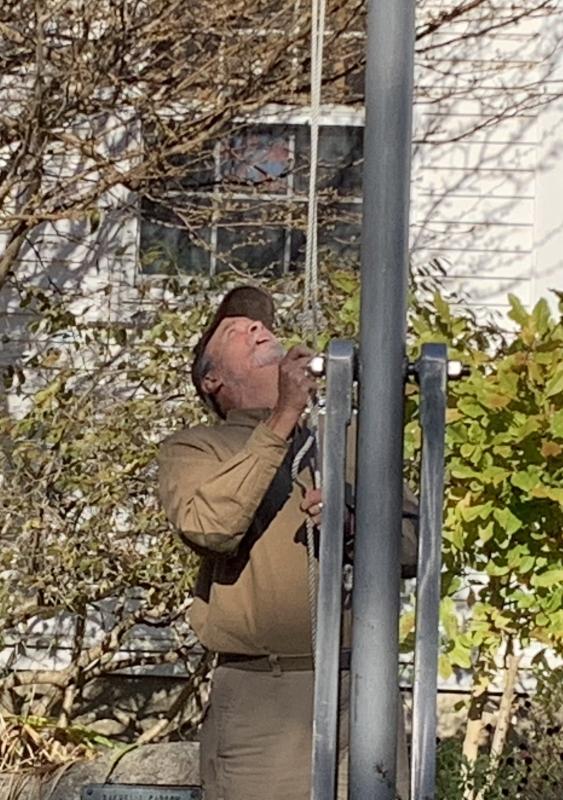 Vietnam veteran Tim Hanley lowers the U.S flag Nov. 11 to begin Southport Memorial Libary's Veterans Day ceremony. BILL PEARSON/Boothbay Register
Vietnam veteran Tim Hanley lowers the U.S flag Nov. 11 to begin Southport Memorial Libary's Veterans Day ceremony. BILL PEARSON/Boothbay Register
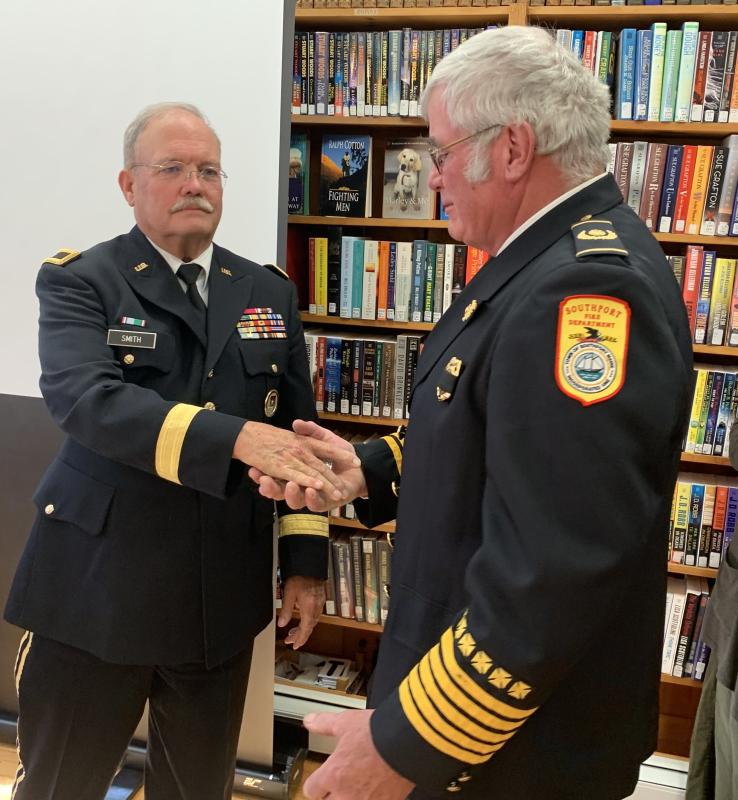 Brigadier General Paul Smith presents Gerry Gamage with a special coin in recognition of his hanging all 150 veterans banners this year. BILL PEARSON/Boothbay Register
Brigadier General Paul Smith presents Gerry Gamage with a special coin in recognition of his hanging all 150 veterans banners this year. BILL PEARSON/Boothbay Register
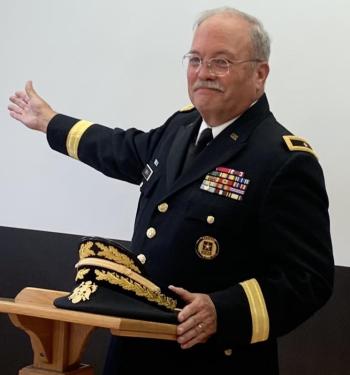 Brigadier General Paul Smith was the featured speaker Nov. 11 at Southport Memorial Library's Veterans Day ceremony. BILL PEARSON/Boothbay Register
Brigadier General Paul Smith was the featured speaker Nov. 11 at Southport Memorial Library's Veterans Day ceremony. BILL PEARSON/Boothbay Register
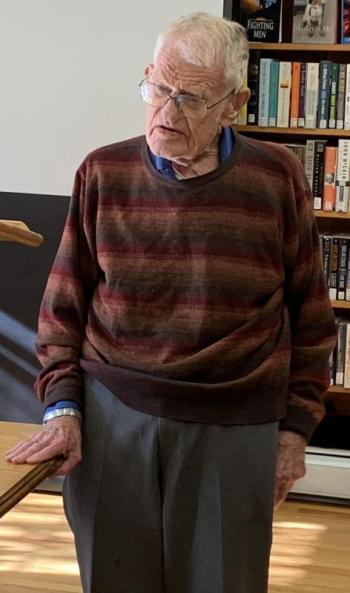 Vietnam veteran Dr. Barclay Shepard recited the poem “In Flanders Fields” during Southport Memorial Library's Veterans Day ceremony. BILL PEARSON/Boothbay Register
Vietnam veteran Dr. Barclay Shepard recited the poem “In Flanders Fields” during Southport Memorial Library's Veterans Day ceremony. BILL PEARSON/Boothbay Register
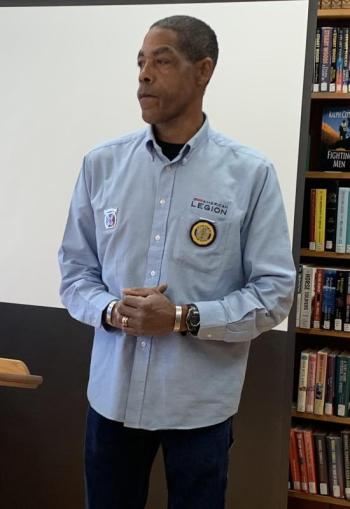 U.S. Army veteran Chris Armstead spoke about his military career on Veterans Day. BILL PEARSON/Boothbay Register
U.S. Army veteran Chris Armstead spoke about his military career on Veterans Day. BILL PEARSON/Boothbay Register
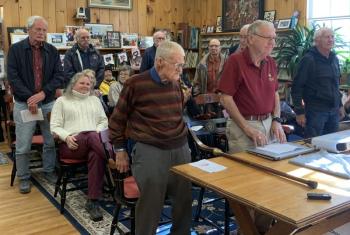 It was standing room only on Nov. 11 during Southport Memorial Libary's Veterans Day ceremony. BILL PEARSON/Boothbay Register
It was standing room only on Nov. 11 during Southport Memorial Libary's Veterans Day ceremony. BILL PEARSON/Boothbay Register
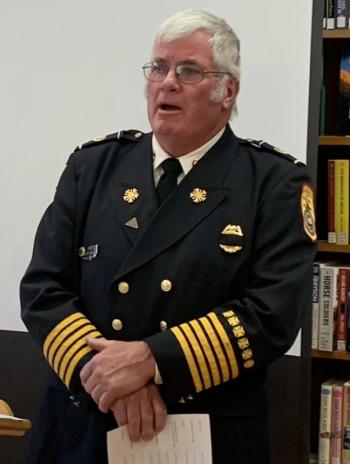 Fire Chief Gerry Gamage led the audience in singing "God Bless America" and "You're A Grand Old Flag” during the Veterans Day ceremony. BILL PEARSON/Boothbay Register
Fire Chief Gerry Gamage led the audience in singing "God Bless America" and "You're A Grand Old Flag” during the Veterans Day ceremony. BILL PEARSON/Boothbay Register
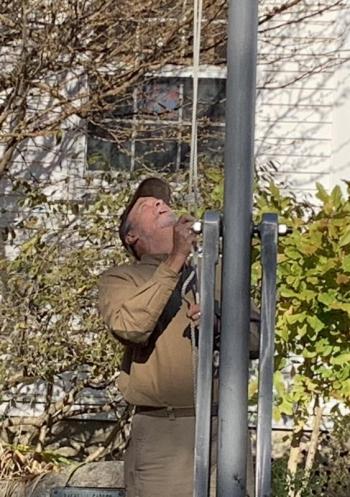 Vietnam veteran Tim Hanley lowers the U.S flag Nov. 11 to begin Southport Memorial Libary's Veterans Day ceremony. BILL PEARSON/Boothbay Register
Vietnam veteran Tim Hanley lowers the U.S flag Nov. 11 to begin Southport Memorial Libary's Veterans Day ceremony. BILL PEARSON/Boothbay Register
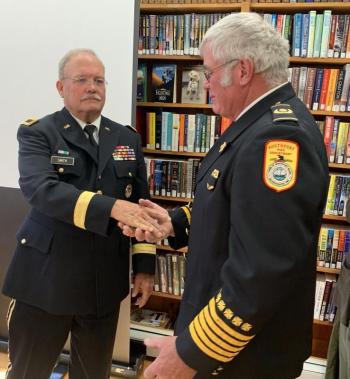 Brigadier General Paul Smith presents Gerry Gamage with a special coin in recognition of his hanging all 150 veterans banners this year. BILL PEARSON/Boothbay Register
Brigadier General Paul Smith presents Gerry Gamage with a special coin in recognition of his hanging all 150 veterans banners this year. BILL PEARSON/Boothbay Register
At the 11th hour, of the 11th day, of the 11th month, 107 years ago, an armistice was signed between Germany and the Allied Powers, ending World War I. A national annual celebration began in 1926 when the U.S. Congress passed legislation stating "It is fitting that the recurring anniversary of this date should be commemorated with thanksgiving, prayer and exercises designed to perpetuate peace through good will and mutual understanding between pieces."
Each year, Southport Memorial Library holds a ceremony to commerate all veterans' contributions in protecting freedom. On Nov. 11, 2024 Vietnam War veteran Tim Hanley lowered the American flag at 11 a.m. over the library as part of a Veterans Day ceremony.
This year's speaker, Brigadier Gen. Paul Smith of West Harbor, spoke about his miliary experience. Smith has spent 38 years in uniform with 35 in the Massachusetts Army National Guard. For Smith, one day stands out in particular: April 13, 2013.
That day was the Boston Marathon bombing. Smith led the Joint Task Force supporting event security. "Now I had served in this task force since I was a young lieutenant, and it mainly involved assisting local police in crowd control along the 26-mile route," he said. "Although the event began well before dawn, it was easy duty, that usually ended without incident."
He left the finish line around 2 p.m. and drove to the command center at Hanscom Air Force Base as the operation wrapped up. On his drive, his BlackBerry began buzzing signaling the calm had ended. Smith recalled a conversation he had with Lt. Col. Mark Merlino. "General, there have been two explosions near the finish line. We believe there are multiple fatalities and widespread injuires. What are your orders?"
Smith had just been informed at 2:49 p.m., an Islamist terrorist attack took place. Smith told the audience he didn't remember his response. He finished the call, and headed to the command center.
Hours after the attack, police and military forces began securing the city and pursuing the terrorists. "I visited the security area every night to gather information and check in with our troops," he said. "I was often struck by the firm, but respectful way they interacted with the people."
Four days later, the terrorists surfaced. They murdered an MIT police officer, hijacked a car, and attempted to flee the city until stopped by Boston Police. One terrorist was killed, the other fled to Watertown, Massachusetts. "In the early morning darkness, leaders used their own initiative to scramble helicopter and deploy military police in armored vehicles into the search area," he said. "Not one soldier balked at pursuing a dangerous terrorist because that is what loyalty, duty, and personal courage require. Late that night, the remaining terrorist was taken into custody."
In the following days, Smith received numerous calls from around the country. Harvard University also asked the National Guard to participate in a case study about why the response to the Boston Marathon bombing succeeded. "The real answer was due to a thousand good decisions and effective actions conducted by very young soldiers, airmen and their junior leaders," he said. "Their training never prepared them to face terrorists in our backyard. The only answer I came up with was the military values guided them. Loyalty. Duty. Respect. Self-Service. Honor. Integrity. Personal Courage."
Smith explained what his story has in common with Veterans Day. "The greatness of the U.S. military is built on the shoulders of giants — warriors who served in World War II, Korea, Vietnam, Operation Desert Storm, Iraq, Afghanistan and many places in which we have fought the Global War on Terror. And so, today is a day to celebrate the values that thrive in the hearts of our veterans and form the foundation of our military."

